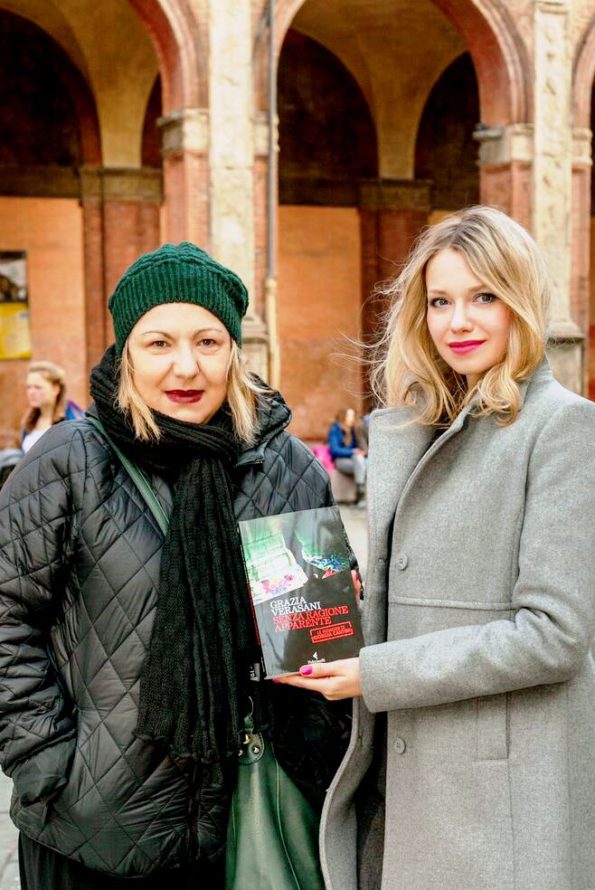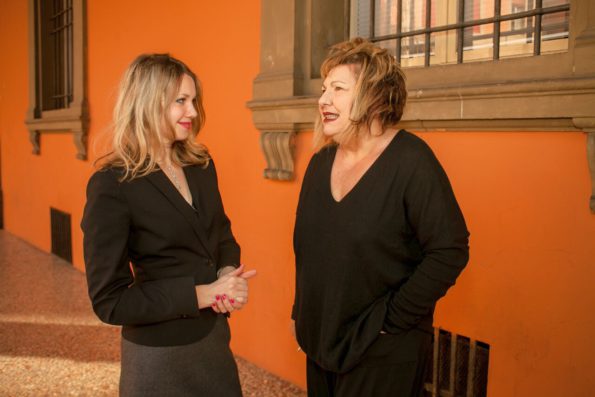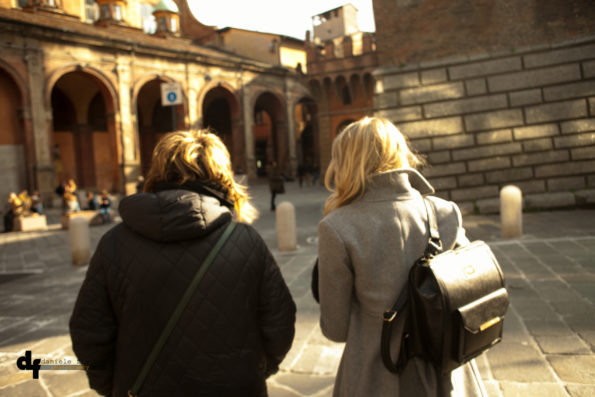MOTHER OF GIORGIA CANTINI PRIVATE DETECTIVE ANNOUNCES HER 14TH PUBLICATION
![]()
![]()
![]()

Grazia Verasani is a successful Italian writer and poet, author of 13 novels; the 14th is coming out soon. In Italy, Germany, France and Russia she is particularly known for a crime series with a female protagonist: private detective Giorgia Cantini. Her books had the best reviews in the world press and one of them, entitled “Quo vadis, baby?”, directed by Oscar Award Gabriele Salvadores was transferred to the movie screen in 2005. In the same year the film become a Tv series directed by G. Chiesa for Italian Sky.
Theatre pieces by Grazia enjoy the same success. Her “From Medea-Maternity Blues” (published by Editor Sironi), presented in Italy and abroad, become a movie directed by Fabrizio Cattani in 2012, when the movie won Best Screenplay Award at Venice Film Festival and one Silver Ribbon and Golden Globe. Another piece, “Vincerò” – a monologue about the life and career of Luciano Pavarotti, was interpreted, in the theater, by Giuseppe Battiston, Giancarlo Giannini and Michele Placido.
I met Grazia in March, 2016, in her beloved city, Bologna, the city she calls “human”. The artist doesn’t really look the part of a crime writer. She is very positive and her smile is really contagious. Walking around her medieval city, we not only talked about her recent publication “Without a reason apparently”, already a bestseller in France, England and USA, but also about women and their rights. Lastly she professed her love to Pierre Lemaitre and encouraged everybody to read the latest novel by Jenny Offil.
You are a successful writer. Your books have been translated into various foreign languages. You are especially loved in France. Was it hard to leave music and the theater for writing?
France is a country where I always return to willingly, because for me this city respects the culture. But in the same way I love London and I will go there as soon as I can. I started my career as a classical pianist. Music has been my first escape valve. I never stopped writing dramas for theatre. My piece “From Medea-Maternity Blues” continues to be shown in Italian and foreign theaters, and became a movie in 2012, winner of many awards. Writing is the glue of all my passions. It is at the base of everything. I approach writing as a musical score. I look for the thrill and I care as much about style as possible.
You are mostly famous for the crime series with the female protagonist, detective from Bologna, Giorgia Cantini. By any chance was it inspired by the crime series by Jo Nesbø with the detective, Harry Hole?
I know and appreciate the Jo Nesbø books, but my literary reference par excellence is Patricia Highsmith. Some journalist called me the Italian Fred Vargas, but I feel more affinity with a social noir by Jean-Claude Izzo or with the versatility of a writer like Pierre Lemaitre. The latter not only writes crime novels but, like me, likes various genres. Like everyone, I have a debt with Chandler and her Philip Marlowe, essential for those who write thrillers. My novels are existential, show surveys on feelings and contain views of reality.
The private investigator Giorgia does not seem very lucky in love; she is melancholic, determined, “very human, and one of us,” wrote La Repubblica. How much Giorgia Cantini is in you?
Let’s say that Georgia is a bit my alter ego. She was born from the desire to describe the women of today, as I see them. I wanted to get away from the usual clichés of the dark lady, the American detective, the wonder woman. This way Giorgia was born: contradictory, uneven, disenchanted. She is a self-deprecating woman, with a heavy past on her shoulders, the theme of suicide is recurrent. She is strong because she admits her weaknesses and privileges the truth. She identifies herself with the lives of others, with special attention to the underdog.
A propos of love, in 2007, you were godmother of the Gender Bender festival. What do you think of gay marriage and stepchild adoption, at moment very controversial issue in your country, Italy?
Italy is a country where even the most progressive political party is struggling to be noticed. It’s a country that reads very little. Women earn much less than men and the culture is not regarded as it should. The interference of the Church is an obstacle that prevents adequate laws. I’m in favor of gay marriage and stepchild adoption. For now we managed to get only the Civil Rights Act, and that was very late. The rest will be a slow conquest.
In 2005, the Oscar winner Gabriele Salvatores director shot the eponymous film based on your book entitled “Quo Vadis Baby?”. The film later become in Italy a Sky TV series directed by Guido Chiesa. Were you present during the filming?
Yes, I worked on the screenplay and I was on the set of the film. It was an adventure, even if cinema and literature are two different languages. Salvatores loved the book and I appreciated his vision. It was something new in Italy – the main character – a woman, not beautiful according to “television” canons, not young and lover of the music from 80s. A woman blues rock, I like to say.
What does Grazia Verasani read in her free time? What is the last book you read that left a mark on you; a book you would recommend to others?
I read a lot, otherwise I couldn’t write. I read many women. I love Helene Humphrys, Elizabeth Jane Howard, Nancy Mitford, Annie Proulx. Recently I read Kent Haruf and Uruguayan writer Mario Benedetti “Dept. Of speculation” by Jenny Offil, which I recommend.
Your latest publication “Without a reason apparently. Giorgia Cantini’s investigation” was presented by you at the Italian Bookshop few months ago in London. How was this book received in England?
It was the second time I was at the Italian Bookshop to present my book. As always the great Ornella Tarantola, of which I am a friend, helped me meet many readers. I love that library, it has moved now but is always active. I have many Italian friends who live in London, for me it is a pleasure to go back every time. London oxygenates me. Theaters are focused on contemporary drama, which in Italy doesn’t exist. I never miss going to Daunt Books. I would sleep inside there.


In the collection of monologues “Accordi minori” [Minor Chords] you talk about artists’ tragic death. Why did you choose this theme?
That little book became a reading accompanied by live music. I recounted the life of artists who lived art as a mission until the extreme consequences, in self-destructive terms. It is a tribute to my love for music, which is tout court my passion, in the sense that I love different kinds of music. I also wrote the monologue “I will win”, based on the life of Luciano Pavarotti, that was interpreted by Giancarlo Giannini and Michele Placido.
Bologna is your home city but also the background of your literary works. In each book you present its different faces. What do you love about Bologna, or there is something that you do not like about your city?
Bologna is a city where you still live pretty well. No lack of libraries, cinemas, theaters, but unfortunately one can feel an Italian reality, in speaking about scarce cultural funding. The city does little for young people, does not take risks. It is an university town with many contradictions, because it is a city of transits but also a place where one is happy and remains here with pleasure. It has these forty kilometers of arcades that shelter from sun and rain, and that can, at the same time, be protective nor suffocating. It is a city that I speak of even when I don’t speak of it, it is part of me, is in my bones even if often I am far away. It lost its trademark counter-cities, it is innovative, as it was in the 70s and 80s. It is approved of by the rest of the country, but it has an extraordinary resistance. What do I dislike? That despite this reputation of a stronghold of the left, the city does not give women enough voice.
In the publication “Of everyone and no one” you raised the issue of violence against women. Did you personally know the victims? In your opinion, does Italian law effectively protect women – victims of abuse?
The macho mentality continues to exert its influence in all spheres. Rape victims are twice victims; the courage of the complaint is often turned against the victim. But, I repeat, it is a particular cultural problem. This is not a country that takes the side of women. Many feminist struggles of the past are constantly put into question. In writing of this novel I followed a case about violence, and I was helped by a policewoman who had to distance herself from colleagues because of their machismo. I spent days at the Women’s House of Bologna and spoke with extraordinary professionals who work every day to help other women. It was a very strong and instructive experience. Getting in touch with some devastating reality will change you inevitably.
Recently you held several conferences at the University of Phoenix and Tempe in Arizona on the European noir. What differentiates the European crime writing from the rest of the world? How does one write the perfect thriller?
I want to say that in Italy noir authors do not have the readership they deserve. “Quo vadis, baby?” was a trailblazer but, because of the usual Italian xenophilia (this genre is consider only for “male”), it was not enough. On college campuses in Arizona I taught kids who study Italian (the 4th language in the world) and who have translated my book “Quo Vadis, Baby?” in the classroom. I loved staying there. When I walked into a classroom they told me that here Ian McEwan had just given a lesson. It was a honor for me. One of my American students, Jeffrey, came to see me in Italy and told me “I like your book because is old.” The funny thing is that he knew whole passages of that book and he quoted them, as if my characters were real. I believe that the differences exist between the noir and thriller. In Europe, the noir or polar, as the French say, recounts the cities, provinces and urban settings where characters move, also inspired by cases in the news, with a psychological depth and social criticism. The American crime story – thriller is more technical, more adrenaline, perhaps less reflective. I mean the authors like Cornwell or Reich. Here, I prefer P.D James, who does not linger in the accounts of autopsies, ballistics analysis, scientific reports. In thrillers there are serial killers and the fight between the good and the evil. Everything starts with a murder and there is a guilty scavenger. I find the nuances and ambiguities. The noir is the story of an atmosphere. Sometimes it’s just more interesting to tell something else: the “mystery-man”, as Dostoyevsky said. I believe that a crime story must be engrossing, enthralling, with a certain narrative tension, the so-called “suspense”, but it should also make us think in a world that does not want to think anymore. Of course, it has to be very well written. Here in Italy there is a proliferation of stereotypical commissioners described with a very rough style.
All your fans, including me, expect the next novel on Cantini detective adventures. Are you already preparing a new book? What it will be?
Giorgia has reached her fifth story and for now I will put her on pause. The next novel (the 14th since I started publishing) will be released in September and is not a noir novel, it is a story about a friendship.
PHOTO GALLERY: Photographic session was made exsclusively for JL INTERVIEWS by Daniele Flaiban @ Other photos comes from GV Archives and represent her with Gabriele Salvatore, Daniel Pennac and Nicoletta Mantovani Pavarotti by Consorzio Creativo @ Cover photo by Luna Simoncini










